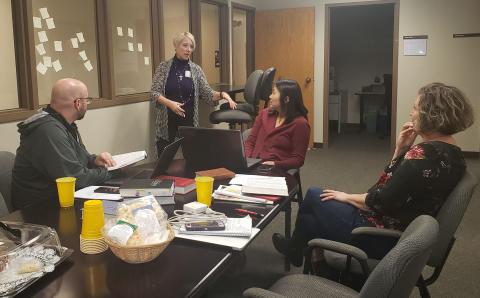This year, The Banner sponsored an article contest for young adults aged 16-25 on the topic of “Christian Love in Divisive Times.” We wanted to hear what young people had to say about the difficult conversations being had in North America right now. We received 25 entries from young people in the Christian Reformed Church. Our three judges read each one without seeing any names attached, and they agreed on three winners (see judges’ comments at the end). This is the first-place winner. Read the second-place winner here and the third-place winner here. We will be publishing some of the runners-up throughout the next several weeks here.
Imagine two Roman centurions fighting about the best way for Rome to deal with the Jewish people around the time of Jesus. One argues for strict control to extinguish uprisings, as he worries about protecting his young family. The other has made friends with a few Jewish men in his precinct and believes Rome should be more tolerant.
Skip ahead 1,500 years and travel to Germany. Agnes and Else are arguing about the growing Reformation movement. Agnes prefers to trust in the authority of the church, as her ancestors always have, while Else is interested in the movement and wants to be able to read her own Bible.
It’s another 500 years later, and society feels more divided than ever. Gun rights, immigration laws, abortion, climate change, and the place of socialism within a capitalist system are issues that divide us today. The past few months of COVID-19, race relations, and vivid examples of police brutality further highlight the divisions that exist between us.
From the outside, society might see the church as a group of people who share a similar worldview. As we know, the opposite is true, with many historic schisms dividing the body of believers. Today we worry about divisions over political allegiances and changing cultural responses to sexuality and gender issues. There will always be disagreements, but we must not let disagreements become divisions.
Unfortunately, our disagreements often do devolve into divisions. Families, churches, and nations are all divided. These divisions hurt. Sometimes we avoid the pain by hiding in echo chambers. These places, either online or in person, make us feel like we’ve got it all right; our beliefs are affirmed. Echo chambers can create and reinforce the labeling of people as “us” and “them.” These labels artificially simplify the nuances of others’ opinions and enable us to blame “them” for division. As a result, we hear statements like “Those liberal-minded folks care nothing about the financial security of our country,” or “Those older folks, they’re so out of touch with current reality.” These statements alienate us from our neighbors, making divisions feel more insurmountable than the Rocky Mountains. How can we heal these divisions?
My pastor recently taught a series about orthopraxy (right practice), which he often contrasted with orthodoxy (right beliefs). As a denomination, we have a history of worrying more about orthodoxy than orthopraxy. Shifting our perspective toward orthopraxy can help us show love in the midst of division. Even when we’re unsure of what to believe, we can practice love.
Of course, orthodoxy is important. We must still stand up for our beliefs. Is there a good way to share our beliefs and spread God’s love?
Jesus provides an example. Throughout his ministry, he would teach and heal. During his encounter with the adulterous women, he acts in a way that protects her dignity and shows her love, turning the tables on the Pharisees by reminding them of their own sin. Jesus only teaches the woman how to live at the very end. His priorities were to love and protect first, and to teach second.
I fear the church has more of a reputation of acting like the Pharisees than like Jesus. Tellingly, I recently read an article from HuffPost titled “Has Evangelical Christianity Become Sociopathic?” The article outlined examples from recent decades of Christians creating division. The author argued that Christians define themselves more by what they oppose than what they believe. He suggested that these stances have caused Christians to be known for spreading hate and contributing to sharp divisions in America. I am Canadian, and a recent conversation I had with an Indigenous person resonated with the article’s sentiment. The visceral way they spoke of Christian missionaries’ abusive impact on their family highlighted their pain. I was left wondering if the divide the church created between it and our Indigenous neighbors will ever heal. Is this the way God wants the world to see his church?
We can strive to stop creating divisions but must also repair divisions that already exist in order to show the love of Jesus. I believe loving starts with listening. As a medical student, I can read information in a patient’s chart before seeing them. While reading, it’s easy to conjure up an image of a patient before I ever meet them. My brain quickly translates “HIV, hepatitis C, alcohol abuse, injection drug use” into “addict, uncooperative, unemployed, drain of health care dollars.” These prejudicial thoughts and assumptions can cause me to hear what I want to hear instead of truly listening to a patient. As a result, I can miss important parts of their story that could benefit the healing process. Being a good care provider means pushing preconceptions aside and listening instead.
Just as truly listening to a patient can contribute to healing in medicine, truly listening to those around us can bring healing to our divisions. Listening helps us see our role in another’s pain and ways we can participate in healing. In the historical examples above, and in our world today, common ground can be gained by listening and understanding. Adopting a posture of love and grace through listening might help our divisions seem more like the rolling Appalachians than the wall of the Rockies.
A historical lens shows us that societies will always have disagreements and, sadly, divisions. However, God calls us to be agents of healing to a broken world. I hope to grow into this posture of listening, to make me a better physician and a more Christ-like child of God. I pray that we, the church, would use the tool of genuine listening to show the world the unifying love of Christ in divisive times.
Discussion Questions:
-
Do I care more about orthodoxy or orthopraxy? Does my greater community think my church cares more about orthodoxy or orthopraxy
-
When was the last time I truly listened to another person’s story? How do stories help to break down barriers?
JUDGES’ COMMENTS:
I thought this author's writing was excellent, and the structure of the essay was solid. I liked the way he brought in references to older divisions, dating back to Bible times. They had great points, such as orthopraxy versus orthodoxy, and I liked his anecdote about assessing a patient.
The author uses effective, concrete examples of how divisions have taken place through time and effectively illustrates how disagreements need not devolve into divisions. I like how he notes that the practice of Jesus was first to love and to protect the vulnerable and then to teach. Overall, the piece shows mature writing style and content. It's well argued and well-written. The Discussion questions at the end are a great bonus, and they reinforce the author's point about the importance of dialogue.
About the Author
Adam Vanderleest is in his final year of medical school at Western University. He loves experiencing God’s creation. He and his wife, Katherine, worship at Talbot Street Church in London, Ont.






